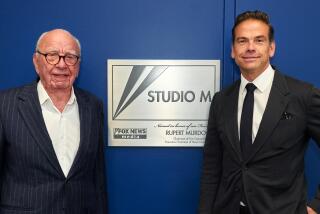Ford Welds Top Posts to Spur Power-Sharing
- Share via
DETROIT — After months of bad news and billions of dollars spent on the Firestone tire crisis, Ford Motor Co. realigned the relationship of its two top executives Thursday to put more power in the hands of family scion William Clay Ford Jr.
The move confirms longtime rumors of a management shift that would more deeply involve the 44-year-old chairman, a great-grandson of company founder Henry Ford, in corporate decisions that have been dominated by 53-year-old President and Chief Executive Jacques Nasser.
“We face challenging times, and this new structure allows both Jacques and me to work hand in hand to lead the company forward and meet these challenges,” William Ford said in a statement. “We will continue to work together to maintain our strong position in the marketplace.”
The establishment of an office of chairman and CEO is designed to have the executives work more closely together and enhance Ford’s role in strategic decision making while reducing Nasser’s considerable autonomy.
“The announcement appears to be a board-driven reaction to mounting pressure at Ford from a number of sources: Firestone recall costs, increased margin pressure on trucks, lower market share [and] launch problems,” said John Casesa, auto industry analyst with Merrill Lynch in New York.
“These changes increase the potential for management distraction at a bad time for Ford,” Casesa said in a report to investors. “The company is not out of the woods on Firestone,” he said, also citing gains made by archrival General Motors Corp. and Japanese manufacturers in the U.S. truck market.
Steven Girsky, auto analyst at Morgan Stanley Dean Witter, was more positive, saying the management realignment should reduce pressure on Nasser.
“It will allow Nasser to focus on developing, building and marketing cars, something he is very good at,” Girsky said. “Bill Ford can work to improve relationships with various constituencies. The net result will be that Ford will be more involved in the business, but Nasser will still be running it.”
Ford took a $2.1-billion after-tax hit in the second quarter to pay for its voluntary replacement of 13 million Firestone Wilderness AT tires that the auto maker determined could be prone to failure.
The world’s second-largest auto maker already had faced accusations that its Explorer sport-utility vehicles are inherently unstable and culpable in hundreds of fatal accidents in which their Firestone tires had failed. Bridgestone/Firestone Inc. was ordered to recall 6.5 million of its tires, mostly on Explorers, in August and asked again by federal regulators this month to recall an additional unspecified number.
In recent months, Ford Motor also has had to weather multiple recalls of its two newest SUVs--the Escape and the re-engineered 2002 Explorer--and seen its ratings for initial vehicle quality and manufacturing efficiency downgraded by influential industry watchers.
Ford became chairman Jan. 1, 1999, culminating his family’s long push to have one of its clan return to the corporate helm. He had held various low-level jobs at Ford Motor before serving in senior positions in truck, climate-control and European operations.
Nasser, who became CEO at the same time, was little known to the public before last fall, when he testified before Congress about the Firestone crisis and appeared in television ads to assert Ford Motor’s commitment to safety.
The Lebanese-born, Australian-raised executive has busied himself hiring outsiders, creating new positions throughout the company, pushing e-commerce and exhorting employees to cut costs and raise quality and customer satisfaction.
“Bill and I are both looking forward to continuing to provide the strategic direction for the company in every key area of the business,” Nasser said in the statement.
Automotive historian David Lewis described the change as “mild compared to what goes on in other places.”
“I think it’s a good move,” said Lewis, a professor of business at the University of Michigan. “It will improve communications between Nasser and Bill and probably will allow Bill to increase his power base.
“It’s the first of several moves that Bill will make to consolidate his position and power,” Lewis said. “But he’ll always have to have Nasser or a guy like him. He’s never going to run the company operationally.”
Nasser and Ford will meet regularly, share decision-making authority and consult with other members of senior management as needed. The new structure was approved by the company’s board of directors and took effect immediately.
“The board has acted in response to Ford’s near-term problems but before they overwhelm the company’s long-term competitive advantages: its relatively strong balance sheet, excellent brand portfolio, effective product creation capability, organized labor stability and powerful U.S. distribution system,” analyst Casesa said.
Executive elbowing is nothing new to Ford Motor, going back to its founder’s ousting of his business partners early in the company’s life. Henry Ford II--grandson of the founder and William Ford Jr.’s uncle--forced out then-President Lee Iacocca in 1978. Rumors of discord between Nasser and the younger Ford, who reportedly wanted to be more involved in decision-making, arose late last year.
Ford Motor shares lost 41 cents to close at $25.09 on the New York Stock Exchange.






